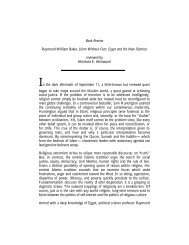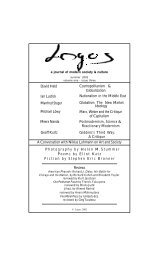Michael J. Thompson Stephen Eric Bronner Wadood Hamad - Logos
Michael J. Thompson Stephen Eric Bronner Wadood Hamad - Logos
Michael J. Thompson Stephen Eric Bronner Wadood Hamad - Logos
You also want an ePaper? Increase the reach of your titles
YUMPU automatically turns print PDFs into web optimized ePapers that Google loves.
Robert J. Antonio<br />
Following Lefort, Howard holds that Marx’s sociological reduction and vision<br />
of materially-driven proletarian unity deny politics’ discursive, contingent<br />
nature and that these historicist ideas, combined with Marx’s highly negative<br />
view of civil society and liberal rights, constitutes a proto-totalitarian ideology<br />
(pp. 77-80, 116-18,166, 209-10, 327, note 10).<br />
Howard states that Castoriadis acknowledged that “Marx bet on history and<br />
lost” (i.e., his hopes about the emancipatory proletariat failed). Howard<br />
implies, however, that Castoriadis still carried on the Marxist project to<br />
transcend Hegelianism with the understanding that it required a much more<br />
radical break than Marx was willing to make. Howard shares Castoriadis’s goal<br />
of moving beyond historicist teleology to a position recognizing history’s<br />
uniqueness, autonomy, and contingency (pp. 87-88). By contrast, Howard<br />
argues, the Frankfurt School failed to make this decisive post-Marxist, post-<br />
Hegelian move and, when their revolutionary hopes crashed, they sought<br />
aesthetic transcendence and rejected “everyday politics” (pp.39-41). Howard<br />
speculates that their deeply pessimistic vision of consumer capitalism’s<br />
seamlessly integrated, depoliticized, “one-dimensional” culture helped inspire<br />
later postmodernist claims about the end of modernity and exhaustion of<br />
politics. In his view, this “antipolitics” or “politics of theory” manifest<br />
constricted political vision, rather than politics’ actual demise. Howard<br />
explains his youthful affiliation with Telos, stressing the initial trouble that he<br />
had getting that formerly left journal, which was then still operating in Marx’s<br />
tracks, to take up Lefort and Castoriadis. He did not mention, however, that<br />
the editor and his inner circle, at that time, posed an extreme version of the<br />
one-dimensionality thesis portraying a near total closure of historical<br />
contradictions and of immanent possibilities for progressive change. This view<br />
not only anticipated pessimistic forms of postmodernism, but the Telos inner<br />
circle’s consequent search for organic community led them to take up Carl<br />
Schmitt in the 1980s and, after, to make an anti-liberal, neopopulist turn.<br />
Howard devotes considerable attention to historical comparison of French and<br />
American political cultures. He holds that the framers of the French republican<br />
regime had to pose a new conception of unity to replace the old monarchy’s<br />
lost integration. Faced with the problem of fragmentation, Howard contends,<br />
they envisioned a republican state reviving political unity. He argues that the<br />
framers of the new French regime stressed inclusion at the national level,<br />
<strong>Logos</strong> 2.3 – Summer 2003




